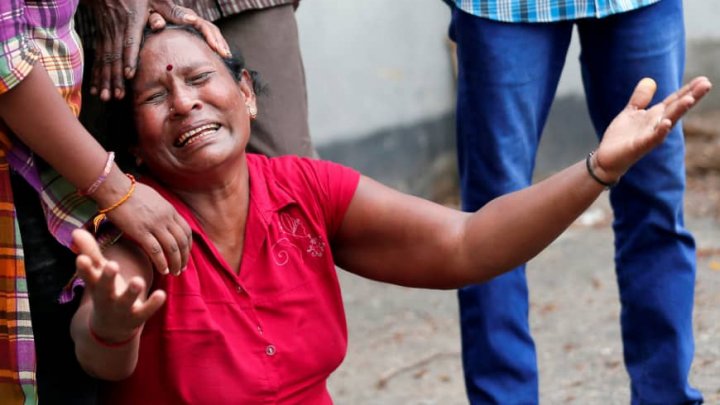Sri Lanka churches bombings: Death toll amounts to 290 in Easter Sunday explosions
 foto: A relative of a victim of the explosion at St. Anthony's Shrine, Kochchikade church, reacts at the police mortuary in Colombo Sunday. | REUTERS
foto: A relative of a victim of the explosion at St. Anthony's Shrine, Kochchikade church, reacts at the police mortuary in Colombo Sunday. | REUTERS
A series of nine bombings in Sri Lanka targeted Christian churches and hotels in three cities. The death toll has risen to at least 290 people and wounded more than 500 others on Easter Sunday, according to officials. Defense Minister Ruwan Wijewardene described the coordinated blasts as a terrorist attack by religious extremists, writes CBS.
- At 8:45 a.m. Sunday, bombs tore apart three churches, one in the capital of Colombo, and two others in the cities of Negombo and Batticaloa.
- Four hotels in Colombo were also attacked: the Shangri-La, the Cinnamon Grand, the Tropical Inn and the Kingsbury. There was another explosion at a housing complex in Dematagoda.
- Those targeted were members of Sri Lanka's Christian population and guests at the island nation's luxury hotels.
- Secretary of State Mike Pompeo said "several U.S. citizens" were among those killed.
- The government of Sri Lanka has temporarily blocked social media services like Facebook and WhatsApp to prevent the spread of misinformation.
- Sri Lanka's police spokesman Ruwan Gunasekera said 24 suspects have been apprehended and the attacks appear to have been carried out by suicide bombers.
- Sri Lanka experienced a vicious 26-year long civil war between its Sinhala Buddhist majority and minority Tamil Tiger ethnic group that ended in 2009.
Japan is confirming one of its citizens was killed in the Easter Sunday bombings in Sri Lanka and at least four were wounded. Foreign Minister Taro Kono offered his condolences to all the victims of the attacks and expressed Japan's commitment in "combating terrorism" and solidarity with Sri Lanka.
Japan also issued a safety warning, telling Japanese people in Sri Lanka to avoid churches, mosques, public places like malls and nightclubs, and government offices related to public security.
-The Associated Press
The Eiffel Tower's Twitter page announced it would turn off its lights "to pay tribute to the victims of the Sri Lanka attacks."
The suicide bombings that killed over 200 people on Sunday have brought back horrifying memories of the violence that plagued Sri Lanka during its brutal civil war that lasted from 1983 to 2009. Faraz Shauketaly, a TV broadcaster at News First and an editor at The Ceylon Independent, spoke with CBSN about the Sri Lanka Civil War and its connection to Sunday's attack.Ce soir, je m'éteindrai dès 00h00 pour rendre hommage aux victimes des attentats du Sri Lanka????????
— La tour Eiffel (@LaTourEiffel) April 21, 2019
Tonight, from 12:00 am, I will turn my lights off to pay tribute to the victims of the Sri Lanka attacks???????? #SriLanka pic.twitter.com/a3tv8b58wn
"In Sri Lanka the ethnic conflict began approximately 40 years ago and finished approximately 10 years ago," Shauketaly told CBSN on Sunday. "It lasted about 30 years and it was mainly by a group of terrorists who claimed to want independence in the northern part of Sri Lanka, which is a tiny island, maximum 240 miles long by about 140 miles wide."
May 18, 2019, will mark the 10-year anniversary since the end of the nation's civil war. It was fought between the Sri Lanka government and its Sinhala Buddhist majority and the Tamil Tigers minority ethnic group.
Sri Lanka is a religiously diverse country of about 20 million people. It contains Buddhists, Hindus, Muslims and Christians.
"We've never had any sort of trouble with -- or anything aimed at -- the Christian community ever before," Shauketaly said, adding that Sunday's terrorist attack, "appears to be targeted at the Christian community.
"This attack today, targeting the churches and also the luxury hotels in our city, in the capital, is absolutely horrendous and caught the people of Sri Lanka completely unaware," he added. "We have enjoyed relative peace for the last 10 years so it came as a complete shock."